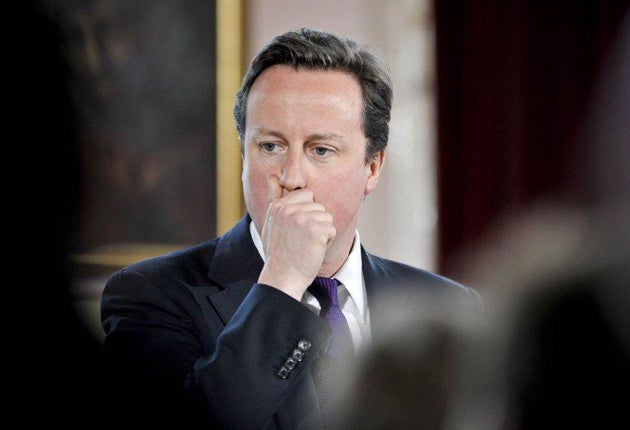Cable leads attack on PM's immigration stance

Your support helps us to tell the story
From reproductive rights to climate change to Big Tech, The Independent is on the ground when the story is developing. Whether it's investigating the financials of Elon Musk's pro-Trump PAC or producing our latest documentary, 'The A Word', which shines a light on the American women fighting for reproductive rights, we know how important it is to parse out the facts from the messaging.
At such a critical moment in US history, we need reporters on the ground. Your donation allows us to keep sending journalists to speak to both sides of the story.
The Independent is trusted by Americans across the entire political spectrum. And unlike many other quality news outlets, we choose not to lock Americans out of our reporting and analysis with paywalls. We believe quality journalism should be available to everyone, paid for by those who can afford it.
Your support makes all the difference.David Cameron came under fire from his Liberal Democrat coalition partners yesterday after controversially claiming that immigration had damaged the social fabric of communities across Britain.
Downing Street also found itself in dispute with statisticians over a central argument the Prime Minister deployed to support his claim that he could slash immigration levels.
Mr Cameron said some areas had suffered a sense of "discomfort and disjointedness" because some new immigrants did not speak English or attempt to integrate with their neighbours. But last night aides were unable to clarify which neighbourhoods he had in mind – or why he chose to make his comments in the almost all-white town of Romsey, Hampshire. Vince Cable, the Business Secretary, led the Liberal Democrat backlash, calling the Prime Minister's remarks "unwise".
In his speech, Mr Cameron said it was time to return to the immigration levels of the 1980s and 1990s, when the number of people coming to the UK was in the "tens of thousands, rather than the hundreds of thousands". Britain needed "good immigration, not mass immigration", he added, and he attacked the "woeful" welfare system which saw Britons languishing on state handouts while foreign workers snapped up new jobs.
Mr Cameron's remarks, in a campaign speech ahead of next month's local elections, were seen in advance – but not endorsed – by the Deputy Prime Minister, Nick Clegg. But they caused a split on one of the trickiest issues for the Coalition. Mr Cable, who has resisted a cap on foreign entrants to British universities and businesses, said: "I do understand there is an election coming, but talk of mass immigration risks inflaming the extremism to which he and I are both strongly opposed."
Senior Liberal Democrat sources said the Prime Minister's remarks had helped to highlight philosophical differences between the parties. "This is a Conservative leader talking to Conservatives using Conservative language," one said. Another added: "This stuff is very dangerous for race relations generally. Cameron is playing with fire."
But Mr Cameron hit back, insisting he was only setting out "coalition policy in terms of controlling immigration properly, which we've debated inside Government, and agreed".
The British National Party's deputy leader, Simon Darby, claimed Mr Cameron had stolen its ideas: "It is cynical opportunism... it is almost like a ceremonial adoption of our policy two weeks before any major vote."
The Refugee Council said the Prime Minister's demand for newcomers to make a greater effort to integrate was being undermined by Government cuts to English language classes.
Sarah Mulley, of the Institute for Public Policy and Research, said: "The Government's target to reduce net migration to 'tens of thousands' is looking increasingly difficult to meet. The policies which the Government is introducing in order to meet the target will cause real economic harm."
In his speech, Mr Cameron said he would achieve his pledge to reduce net migration to the UK from "hundreds of thousands to tens of thousands" of people. Cutting migration from outside Europe will be crucial to this policy because EU citizens have the right to work in other member states.
Mr Cameron said his plan was achievable because net migration from the EU to Britain in the year 2009-10 was 27,000 people, which he described as a "small proportion" compared with the 198,000 migrants who arrive here from outside the EU. But the Office for National Statistics said the Prime Minister had dramatically underestimated the figure for EU migration during the period, which it calculated was 57,000.
Join our commenting forum
Join thought-provoking conversations, follow other Independent readers and see their replies
Comments